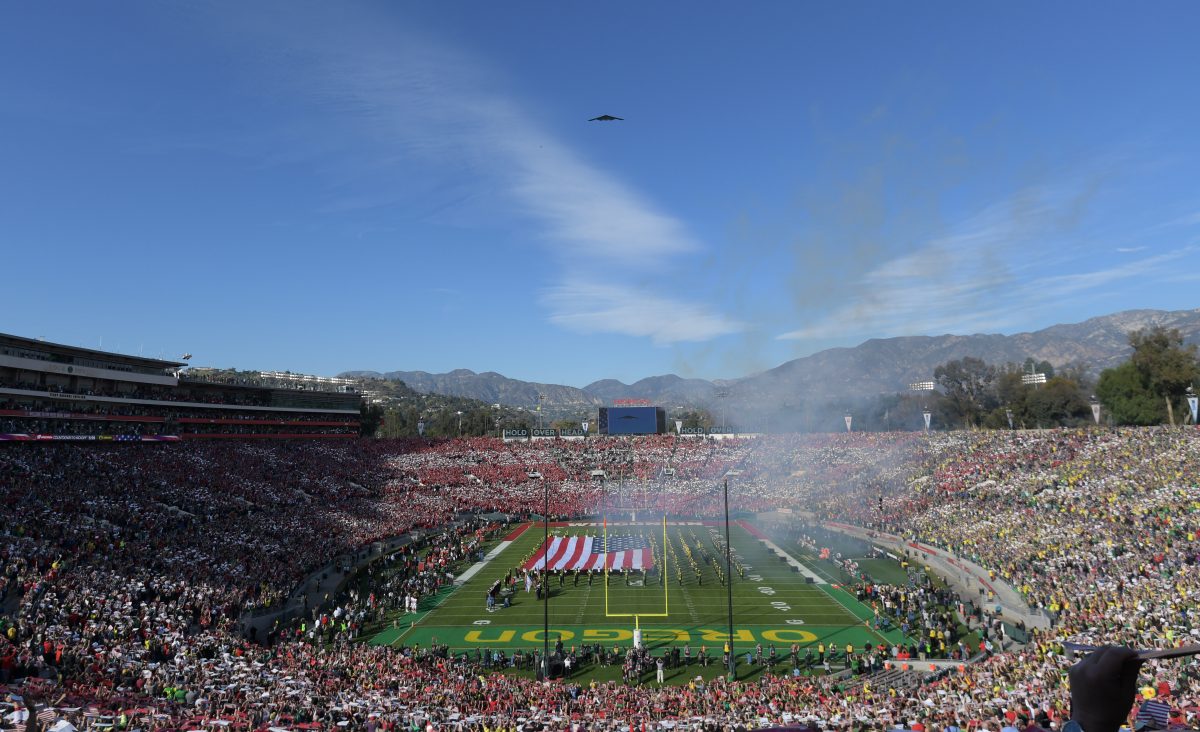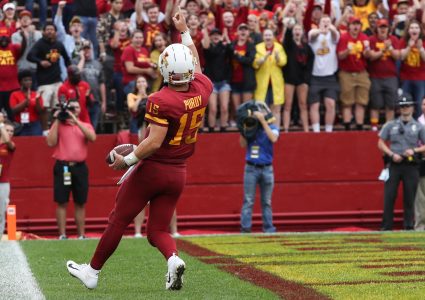Pandemic and political bickering aside, it’s what everyone in my circle is talking about: Are we going to have a college football season and what will it look like?
“I don’t know” has been my answer to most of this stuff since the middle of March. There are times in life where the hacks need to let the smart people in the room handle their business and just butt out for a little bit.
It’s what I tried to do throughout April. But while working the phones the first two weeks of May, I did sense some optimism after talking to numerous sources within the sport.
I will go as far as to say that in some capacity, I believe college football is going to be played in 2020-21. However the specifics and details of how this will play out are impossible to predict.
I’ve been thinking long and hard about all of the different scenarios in play here. Allow me to think out loud below with thoughts on all of the changes that could come.
Will the COVID-19 summer change recruiting forever?
COVID is teaching businesses around the globe how to work leaner than ever before.
This ultimately isn’t great for our nation’s unemployment numbers, but from a sheer business standpoint, folks have been forced to evolve digitally. Many businesses will come out of this stronger on the other side.
Will this be the case in college football recruiting?
With coaches and other athletic department employees across the country taking pay cuts, and with more budget constraints on the way (especially in a possible world without fans at games), a Zoom call with a prospect instead of a cross-country charter flight sounds pretty intriguing for an athletic department’s number cruncher.
Recruiting won’t ever be 100 percent digital in the future, but here is an area where wasteful spending can be cut. And if your staff is good at it, this can be a significant advantage (not to mention, time-saver) for programs in the future.
Show me a 17-year old who isn’t glued to his/her phone these days…
We have entered the Work From Home Era of business.
Ask yourself this: Why are people flying cross-country for meetings when they can knock it out digitally in 30 minutes? There is a reason why the great Warren Buffett recently unloaded all of his airline stocks.
I can make an argument that for geographically isolated programs (where not that many driving trips can be made for recruiting purposes), evolving recruiting tactics through the COVID pandemic will ultimately be a net positive from a financial and productivity standpoint.
Is it even possible that all 130 FBS college football programs play this year?
It’s only mid-May and call me a pessimist, but I just don’t see how this happens. My mind was even more solidified on Tuesday when California announced that its public institutions would be primarily online in the fall.
Perhaps some sort of a mass-produced therapy to fight COVID pops up between now and then, which would be fantastic and could be a game-changer. But from what I understand, wheels are already in motion behind the scenes for a vastly different shape to the season. Conferences and athletic departments are already making contingency plans.
We have to be realistic about the fact that COVID has affected and will continue to affect certain areas of the country in different ways on different timelines.
And politics will play a role in all of this. The right needs to show that it has a handle on the virus to get the economy turned back around before the election in November. And I’m not just talking about the stock market–unemployment numbers, futures, all of that stuff. Meanwhile, the left needs to make the right look as incompetent as possible to regain control at the federal level.
I fear that college football will become a political weapon for both sides.
With that, doesn’t it make sense that the Big 12 will be a “go” in the sense that every state housing one of the league’s program is considered to be politically conservative at the top? The SEC is in a similar situation, and football is basically the gospel down there. Folks may literally riot without a season.
What about the Big Ten and ACC though, where the states are basically half and half politically?
Will the Pac-12 even play?
What if the California schools aren’t able to go but the Arizonas are?
This is could be a major problem for the Pac-12, which is already behind the other Power-5 leagues in terms of revenue, exposure and success on the field.
Who is working together here and when does it become a free-for-all?
It sounds like this whole thing began as a situation where the Power-5 was working together in all of this. It is my understanding that this is still happening. But there could come a point where this is out of the hands of athletic directors, coaches and even conferences. We might have seen that happen on Tuesday in California.
Do we get to a point where say, on July 1 (just an arbitrary date), the suits get together and form a new college football league for one season only? They put all of the programs that are able to play in a pile, sort them out geographically (it makes sense to not have thousands of players and coaches flying around the country every weekend), and create an NFL-type of system with divisions for one year only?
You would have to get the television partners involved, but they essentially have no choice but to cooperate because they desperately need the inventory.
One Big Thing
— Stanford Steve (@StanfordSteve82) May 13, 2020
Limited action for #Maction pic.twitter.com/u77xf4El9e
How does COVID affect the future of television and the sport?
Perhaps nothing has shaped college football more over the last 20 years than television. Without it, the conference realignment craze from the 2010s never happens. The money that’s come from this has caused coaching salaries to sky-rocket and facilities to go bonkers.
Example: Did you know that Clemson has a Whiffle Ball field for players within its football complex (to go with mini-golf and bowling, naming only a few perks)? Come on.
ESPN and FOX will always be factors. Predicting anything else would be ludicrous. But COVID has smacked those entities directly in the mouth (especially ESPN, whose parent company is Disney, which relies heavily on its closed theme parks for revenue) while the cord-cutting competition like Amazon, Netflix and Apple (whose stocks and market share are near or at all-time highs) have only gotten stronger through the pandemic.
Visual Capitalist recently released data regarding the changes in media consumption by generation since the COVID-19 crisis hit our country.
Millennials (24-37 year olds) are watching online television and streaming at an increase of 41 percent.
Generation X (38-56 year olds) are doing the same at an increase of 38 percent.
Finally, approximately 21 percent of Baby Boomers (57-64 year olds) are now watching TV online and streaming consistently for the first time.
My parents are in their 60s and threw a fit when Iowa State played basketball games on ESPN+ last winter. They currently subscribe to Mediacom strictly so they don’t have to worry about streaming Iowa State games via their computer on cyclones.tv.
But now my parents are binge-watching shows on Netflix daily.
COVID has accelerated our media consumption habits to streaming and the tech companies will be richer because of it.
Content is king and for the most part (sans Amazon and a few NFL games), these streaming giants have stayed out of sports.
But for how long?
In 2024, the majority of television rights for college athletics will come up and the affects of COVID might drastically change how that looks going forward.
(Note that Apple and the Pac-12 have already had conversations about this very topic.)
A final thought…
There is a lot of pessimism swirling regarding the immediate future of the sport, but let me point out a couple of positives and yes, there are a few.
First of all, at the time of publishing this (May 13, 2020), there are COVID developments daily, if not hourly. A lot can change between now and kickoff on September 5.
Most importantly, never forget that college football is a mega-business. Thousands of jobs rely on it happening, and other than men’s basketball, essentially every other college sport relies on the money it produces to exist. The hits have already begun as the missed conference tournaments and NCAA Tournament dealt an initial punch financially to the gut of athletic programs. College Football not happening could be a TKO.
One example: Starting in 2021, the MAC has already made a massive cost-cutting decision, axing conference tournaments for eight sports largely because of COVID.
College football is the financial lifeboat for athletic departments across the country. It is also vitally important to the media giants that invest in it.
Somehow, someway, my guess is that the power brokers at the top will make sure that college football SAFELY exists in some fashion when this fall comes around. It might be the most unique season in the sport’s history. In fact, I’ll go on record right now to say that it likely will be.





